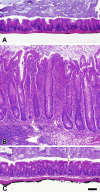Bacterial-mucosal interactions in inflammatory bowel disease: an alliance gone bad
- PMID: 18927210
- PMCID: PMC2604805
- DOI: 10.1152/ajpgi.90516.2008
Bacterial-mucosal interactions in inflammatory bowel disease: an alliance gone bad
Abstract
The complex interaction of genetic, microbial, and environmental factors may result in continuous activation of the mucosal immune system leading to inflammatory bowel disease (IBD). Most present treatments for IBD involve altering or suppressing the aberrant immune response; however, the role of the intestinal microbiota in the pathophysiology of IBD is becoming more evident. The epithelial layer is essential for the proper functioning of the gastrointestinal tract, and its increased permeability to the luminal antigens may lead to the inflammatory processes and mucosal damage observed in IBD. Factors affecting the efficacy of the epithelial barrier include presence of pathogenic bacteria (e.g., Helicobacter spp.), presence of probiotic bacteria, availability of selected nutrients, and others. Defective function of the mucosal barrier might facilitate the contact of bacterial antigens and adjuvants with innate and adaptive immune cells to generate prolonged inflammatory responses. This review will briefly describe the complex structure of the epithelial barrier in the context of bacterial-mucosal interactions observed in human IBD and mouse models of colitis.
Figures



References
-
- Abraham SN, Duncan MJ, Li G, Zaas D. Bacterial penetration of the mucosal barrier by targeting lipid rafts. J Investig Med 53: 318–321, 2005. - PubMed
-
- Aono S, Hirai Y. Phosphorylation of claudin-4 is required for tight junction formation in a human keratinocyte cell line. Expl Cell Res. In press. - PubMed
-
- Ardizzone S, Bianchi PG. Biologic therapy for inflammatory bowel disease. Drugs 65: 2253–2286, 2005. - PubMed
Publication types
MeSH terms
Grants and funding
LinkOut - more resources
Full Text Sources
Medical
Research Materials
Miscellaneous

